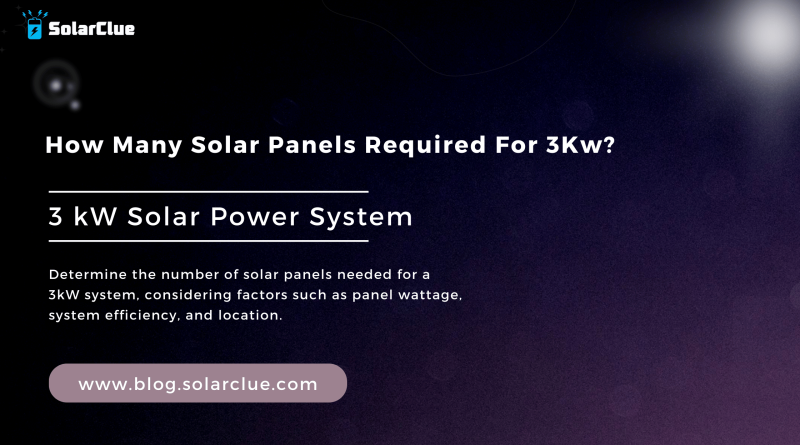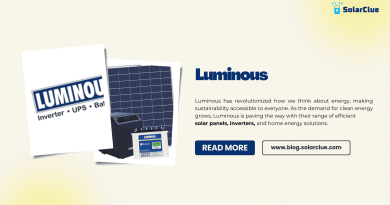How Many Solar Panels Required For 3Kw?
A 3kW solar power system is a popular choice for residential applications, providing a substantial amount of energy to reduce electricity bills and contribute to a sustainable future. This blog will help you determine the number of solar panels needed for a 3kW system, considering factors such as panel wattage, system efficiency, and location.
Table of Contents
- 1 Understanding Solar Panel Wattage and System Sizing
- 1.1 Solar Panel Wattage:
- 1.2 System Sizing:
- 1.3 Optimizing Panel Placement for Maximum Sunlight Exposure
- 1.4 Solar Panel Sizing for a 3kW System with Indian Brands
- 1.5 Balancing Cost and System Performance
- 1.6 The Role of Inverter Efficiency in System Output
- 1.7 Additional Considerations for Solar Panel Installations
Understanding Solar Panel Wattage and System Sizing
Solar Panel Wattage:
Solar panels come in various wattages, typically ranging from 250W to 400W. The wattage indicates the power output of a panel under standard test conditions.
System Sizing:
A 3kW system means it can produce 3 kilowatts of power under optimal conditions. To determine the number of panels, you need to divide the total system capacity by the wattage of each panel.
Optimizing Panel Placement for Maximum Sunlight Exposure
Orientation: In India, panels should face true south to maximize sunlight exposure.
Tilt Angle: The optimal tilt angle is usually equal to the latitude of the location. Adjustments might be needed to account for seasonal variations.
Shading: Avoid shading from trees, buildings, or other obstructions, as even partial shading can significantly reduce system performance.
Solar Panel Sizing for a 3kW System with Indian Brands
| Panel Wattage (W) | Number of Panels Required |
|---|---|
| 250 | 12 |
| 300 | 10 |
| 350 | 9 |
| 400 | 8 |
Balancing Cost and System Performance
Higher wattage panels reduce the number of panels needed, potentially lowering installation costs and space requirements. However, they tend to be more expensive per panel. Consider the following when balancing cost and performance:
- Initial Investment: Higher efficiency panels cost more but may save on installation costs.
- Available Space: Higher wattage panels require less space.
- Long-term Savings: More efficient panels may offer better long-term savings through higher energy production.
The Role of Inverter Efficiency in System Output
Inverters convert the DC power generated by solar panels into AC power used by most home appliances. Inverter efficiency typically ranges from 95% to 98%. Consider the efficiency when calculating the overall system output.
Additional Considerations for Solar Panel Installations
Battery Storage: Adding battery storage can help manage energy usage more effectively by storing excess energy produced during the day for use at night or during cloudy periods.
Energy Consumption Patterns: Analyze your energy consumption patterns to determine if a 3kW system meets your needs. Adjust the system size accordingly if your energy usage is significantly higher or lower.
Local Regulations and Incentives: Research local regulations, building codes, and available incentives or rebates that can impact your installation process and overall costs.
Conclusion
Determining the number of solar panels needed for a 3kW system involves understanding panel wattage, system efficiency, and optimizing placement for maximum sunlight exposure. By balancing cost and performance and considering additional factors like battery storage and energy consumption patterns, you can design a solar power system that meets your energy needs effectively.
Here at SolarClue®, we offer a smart, practical, and “beautiful” solution. You will be answered for all the questions related to Solar.
We provide all kinds of brands that are the Best Solar panels in India.
If you are the one who is planning for the solar power system. Don’t hesitate to contact our team!
Looking forward to empowering you with solar energy, just like hundreds of our other clients!
FAQ Section
1. How do I determine the wattage of a solar panel?
The wattage is usually indicated on the panel’s specification label or datasheet.
2. What is the ideal orientation for solar panels?
Panels should face true south for maximum sunlight exposure in India.
3. How does shading affect solar panel efficiency?
Shading can significantly reduce the efficiency and output of solar panels. It’s important to avoid shading as much as possible.
4. What is inverter efficiency, and why is it important?
Inverter efficiency is the ratio of the AC output power to the DC input power. It affects the overall system output and performance.
5. Should I consider adding battery storage to my solar system?
Adding battery storage can help manage energy usage more effectively and provide backup power during outages or at night.


